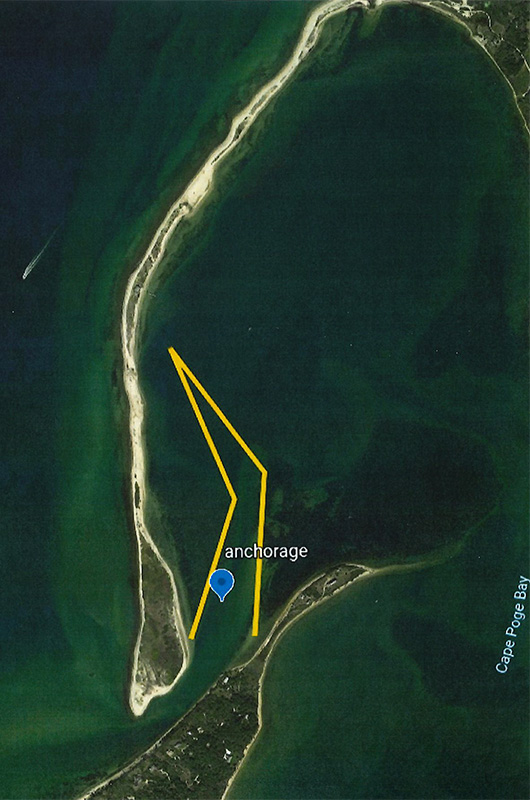The Edgartown selectmen voted unanimously Monday to institute a first-of-its-kind moratorium on anchoring in Cape Pogue Pond, finalizing a long-held recommendation from the town’s marine advisory committee after recreational boaters flooded the ecologically sensitive marine basin last summer.
The one-year anchoring moratorium will apply to almost the entire pond, save for a small, V-shaped sliver just inside of the gut — the colloquial term for the pond’s opening into the outer Edgartown harbor. It reflects a growing regional balancing act as town officials attempt to weigh the unique area’s recreational, commercial and ecological uses, which are historically shared but have come into conflict in recent years.
New regulations will also include a marked entrance to the gut with no-wake buoys and the stationing of a member of the harbor master department, police or shellfish department in the pond during weekends and holidays during the summer for enforcement.
The anchorage moratorium comes in the wake of a pandemic summer that saw an unprecedented number of boaters — many from the Cape and South Shore — rafting in the pond on weekend days in July, August and September, irking town residents and causing deep concern among about the health and safety of the area’s fragile ecosystems, as well as its character.
Known scientifically as a coastal embayment rather than a Great Pond, Cape Pogue Pond is a shallow, approximately 115-acre circular basin on the north side of Chappaquiddick that is surrounded by barrier beach and connected to Poucha Pond through a channel to the south. The watershed covers some 815 acres. The bay serves as one of the prime shellfishing grounds in the state for bay scallops and quahaugs — and is home to some of the Island’s most remote, pristine beaches and serene waters.
At a February public hearing, Edgartown harbor master Charlie Blair estimated that certain weekend days last summer saw more than 150 boats in the pond, while members of the town marine advisory committee, as well as Cape Pogue residents, registered their alarm over what they described as reckless and inappropriate behavior from recreational boaters. Others, including kiteboarders, advocated for keeping the pond open to anchoring, honoring its historic use as a recreational waterway for boaters.
Most of the land surrounding the pond is owned by Trustees of Reservations, who allow over-sand vehicle access to the area for fishermen, birders and recreational beach-goers.
At the selectmen’s meeting Monday, marine advisory committee chairman Bruce MacIntosh explained the moratorium, and said it came after months — if not years — of discussion among the three-member committee, whose other two members are Martin (Skip) Tomassian and Ed Handy. In a concession to the pond’s role as a recreational waterway, Mr. MacIntosh said a small section that is unproductive for scalloping would remain open to anchoring, according to the committee’s recommendation.
Shellfish constable Paul Bagnall expounded on the science of the decision to keep a small section of the pond open in a letter to the town selectmen, dated March 12.
“This anchorage area is primarily over a mud hole (anaerobic area) between two productive bay scalloping areas. It will allow for access to the pond while limiting environmental damage and protect the eel grass beds found there,” Mr. Bagnall wrote.
The area runs just inside the gut and then turns left toward the embayment’s west elbow — a popular area for beach goers who often will pull their boats to the shore.
Selectmen approved the moratorium with no discussion. It goes into effect immediately and will last through the summer.
“I appreciate the marine advisory committee, the harbor master, the shellfish warden and the shellfish committee all pulling together to come up with these recommendations,” selectman Art Smadbeck said.
Town administrator James Hagerty said town officials would buoy off the area that is open to anchoring and requested that the town departments coordinate to ensure that there was an enforcement presence in the pond. Mr. Hagerty suggested rotating enforcement between the harbor master, police and shellfish departments.
Last Thursday, the Martha’s Vineyard Commission also approved changes to the Cape Pogue district of critical planning concern that will allow for the creation of an advisory committee to enforce new regulations regarding the pond’s recreational use. The DCPC amendments are set to come before voters at Edgartown’s annual town meeting in May.
“That group of multiple stakeholders hopefully will get approved at town meeting, and in turn they can come up with a more solidified, and long-term solution, to addressing the potential issues,” Mr. Hagerty said.







Comments (23)
Comments
Comment policy »